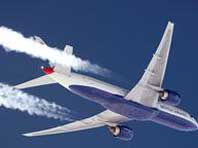| Videos | • Latest |
|
• Feature | • Sports | • Your Videos |
EU carbon tax hits Chinese airlines
As the Copenhagen meeting approaches, the Chinese civil aviation industry is facing unprecedented pressure for environmental protection. The European Union is charging its largest-ever carbon emission taxes on global flights entering its airspace.
Eleven Chinese airlines are on the list. This could be a huge burden for Chinese carriers, which has seen their business grow in recent years.
For many Chinese airlines still reeling from the global financial crisis, the carbon emission tax levied by the EU could bring another crisis.
Fan Cheng, Vice President, Air China, said, "The carbon charge will increase our operational cost by at least 200 million yuan each year. In that case, we won't make any profits at all."
According to the EU's plan, all planes entering its airspace have to pay a carbon emission tax according to the distance of their flight. Based on the current carbon trade price, a Boeing 747 flying from Shanghai to Paris could be taxed more than ten thousand Euro. Airlines have to pay for the entire distance from take-off to landing, and not just for the portion within European airspace.
Many Chinese airlines can't afford this levy, that includes state-owned Air China. The company has 20 European routes and face the loss of tens of thousands of yuan each year for the bill.
It will be even harder for smaller airlines to survive. Those without routes to Europe also have to pay.
Wang Zhengua, Borad Chairman, Spring Airline, said, "We fly 14 Airbus 320's, most were purchased from Europe. They have to return to the continent for maintenance. The trip will cost a lot because of the carbon charge. It's going to be a heavy burden for us."
The EU's carbon emission tax covers all planes flying to Europe, where most assembly lines and maintenance facilities for Boeing and Airbus are situated. The region is expected to gain at least 2.4 billion euro from tax income each year.
This has drawn criticism from some, who see the tax as a new form of trade protectionism in the name of environmental protection.
The EU may have foreseen such a negative response to its move. Its pledging to distribute certain greenhouse gas emission quotas for free. But this is only available for those who reduce emissions below 97% of their average level from 2004 to 2006 by 2012. Companies reaching that standard only need to pay 15% of their total tax. Those who don't meet that standard have to pay the entire tax.
For Chinese airlines, meeting that standard is almost impossible, especially since their business boomed fastest throughout the world.
Zhang Baojian, Regional VP International Air Transport Assoc., said, "Chinese carriers may suffer most once the EU's plan is launched. For a saturated market like the EU, there won't be any increase from 2006 to 2012. But the Chinese market is still growing. The scale of its market in 2012 will probably be double what it was in 2004. So the faster their business develops, the more they will have to pay to the EU for the carbon emission tax."
Although companies are upgrading airplanes to be environmentally cleaner, they are unlikely to return to previous carbon emission levels. Now they have to look ahead. If the EU insists on its policy, some Chinese airlines will have no choice but to cancel their European business.

 0 Comments
0 Comments







Comments